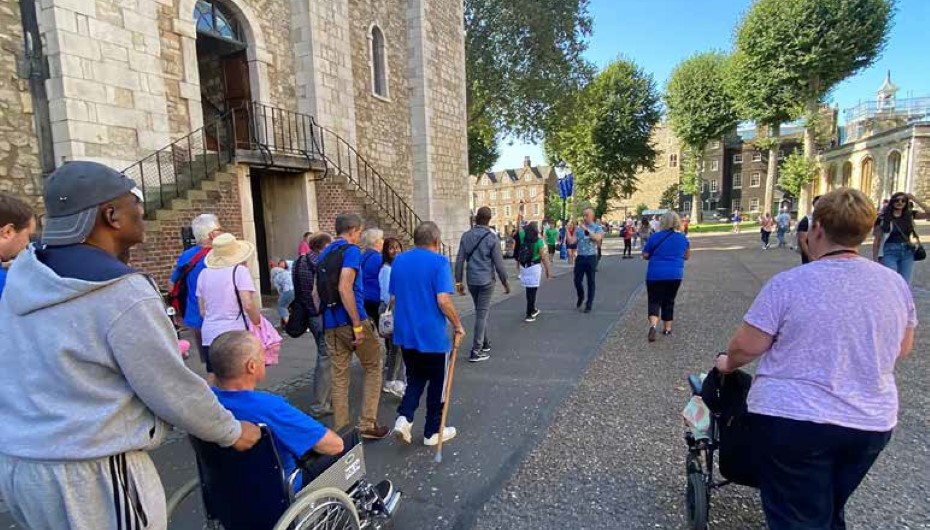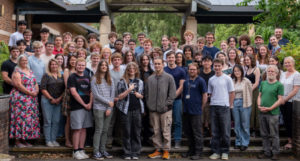Nature vital to improving visitor attractions for people with dementia

Wheelchair users among a Young Onset Dementia Group at the Tower of London. Credit: S J Page
Using nature to make visitor attractions more dementia-inclusive will be the focus of an event at the Tower of London tomorrow (31 January).
Kew Gardens, the Tower of London, Seaton Tramway, Strawberry Hill House, Beamish Museum and the Bishop’s Palace will be among the organisations sharing their own experiences of leading dementia-inclusive projects in nature, developed through the ENLIVEN Project.
ENLIVEN is a three-year research project based at the University of Exeter, launched in response to the UK’s ageing population with the aim of promoting how good health and activity adds not just years to life, but also life to years.
An expert team from the Universities of Exeter, Hertfordshire, Brunel, Manchester Metropolitan and Bradford, as well as Innovations in Dementia CIC and The Sensory Trust collaborated with businesses and organisations to improve understanding of the nature component of visitor attractions and how they can improve the experience of visitors with dementia.
ENLIVEN has supported projects including at the Tower of London, which hosted visits to the new wildflower moat, empowering people with cognitive impairment to explore and engage with nature in a unique urban setting.
Other ENLIVEN projects included a one-day cycling event at Burrator Arboretum in Dartmoor National Park, mindful dementia-friendly photography walks at Beamish Museum, County Durham, and bird of prey flying experiences at the British Bird of Prey Centre in Carmarthenshire.
Academic experts from ENLIVEN, which stands for ‘Extending active life for older people with cognitive impairment and their families through innovation in the visitor economy of the natural environment’, will present the evidence-base for dementia-inclusive nature-based experiences at the Tower of London event, which will be hosted by former BBC journalist David “Fitz” Fitzgerald.
There will also be a speaker from the Alzheimer’s Society, and a film showing in which people with dementia speak about the value of experiences in nature.
Joanne Connell, an Associate Professor in Sustainability and Tourism at the University of Exeter Business School, said: “It is estimated that one in two people will be touched by dementia, yet its importance tends to be overlooked by society and by communities. Our understanding of dementia is changing, but there is still a long way to go and everyone in society has a role to play in this – and businesses and organisations are no exception.
“There are many ways in which nature-based businesses and outdoor visitor attractions can help to promote inclusion and enhance the well-being of people living with dementia. Through ENLIVEN we have worked with businesses and organisations to develop and deliver visitor experiences and services that will benefit people living with dementia across the country.”
Stephen Page, Professor of Business Management at the University of Hertfordshire, said: “People living with dementia often face barriers to achieving a good quality of life. This fantastic event will showcase how the UK’s visitor economy can help to develop dementia-inclusive outdoor spaces, so people living with dementia can enjoy spending time in the outdoors to maintain an active lifestyle.
“The conference will bring together people in the visitor economy to share research conducted by the ENLIVEN project and findings from businesses who implemented innovative projects to develop nature-based experiences in 2023. These iconic attractions have ranged from events at the Tower of London and Kew Gardens to much smaller sites who have just embarked on their dementia-inclusive journey.”



